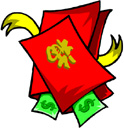Chinese New Year
Part 1: Traditions and Beginnings Chinese New Year is both the first day of a new year and a 15-day celebration of what is hoped to be good times ahead. It is celebrated in China, of course; but major celebrations take place in other countries as well. The Chinese calendar is based on the movements of the Moon and the Sun, not necessarily on the Western Calendar, so the New Year isn't the same day on the Western Calendar every year, although it is always on a day between January 21 and February 21. (In 2024, the New Year begins on February 10 on the Western Calendar.) People spend nearly a month ahead of time getting ready for the New Year, preparing special home decorations and buying special ingredients for special foods. Part of the decorations are chun lian, or couplets, special phrases that are posted at front doors and resemble what comes in fortune cookies but are more thought-provoking and serious. The "spring cleaning" that goes on is also spiritually cleansing, allowing people to get rid of things that they don't want to hold on to and look to the year ahead, to a prosperous future. The celebrations begin with a New Year's Eve feast called a Reunion Dinner, at which family members gather together and salute good times past and present (and, it is hoped, future) with meals of chicken, fish, and special vegetables. During the New Year celebrations, special foods are eaten and special customs are upheld. It's all a way of saying that tradition continues as new years go by. This feast is also called weilu, with a focus on one's ancestors and how their traditions continue to live on in people alive today.
On the Second New Year's Day, though, a great feast is planned and executed. They pray to their ancestors, for guidance in the New Year. They are also extra kind to dogs. This Second New Year's Day is believed to be the birthday of all dogs. The Third and Fourth New Year's Days are reserved for sons-in-law to visit their wives' parents and profess respect toward them. Po Woo is the name of the Fifth New Year's Day. Prayers this day go to the God of Wealth. People do not visit family and friends on this day because they believe doing so would bring bad luck to everyone involved. Next page > Looking Ahead > Page 1, 2 |
|
Social Studies for Kids
copyright 2002–2026
David White



 On the First New Year's Day, Chinese people celebrate by giving one another hong bao (red packets), which contain small amounts of money. (Some give lots of money.) These packets are given to family members and friends (who typically smaller sums of money than family do). The amount of money is always an even amount, since an odd amount is believed to bring bad luck. No great feast is planned on this day; meals are usually vegetarian because many Chinese people believe that giving up meat on this first day will help them live a longer life.
On the First New Year's Day, Chinese people celebrate by giving one another hong bao (red packets), which contain small amounts of money. (Some give lots of money.) These packets are given to family members and friends (who typically smaller sums of money than family do). The amount of money is always an even amount, since an odd amount is believed to bring bad luck. No great feast is planned on this day; meals are usually vegetarian because many Chinese people believe that giving up meat on this first day will help them live a longer life. 
